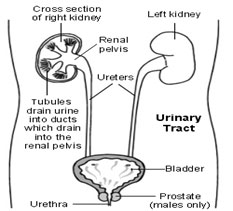What is a kidney stone?
A kidney stone is also called a renal calculus or renal lithiasis. Kidney stones are small hard stones made up of minerals and acid salts that form in your kidneys. Kidney stones may eventually move through your urinary tract.

What causes kidney stones?
Kidney stones are often formed when the urine becomes concentrated causing the minerals to crystalize and stick together. Many factors can cause kidney stones. Dietary factors are the main cause for kidney stones such as low fluid intake and eating foods high in animal protein, sodium (salt), calcium, and sugar. Other factors can include family history, age (>40), gender (males with higher risk), obesity, urinary tract infection, digestive diseases, and surgery.
What are symptoms of kidney stones?
Many stones are formed and passed without causing symptoms. If a kidney stone is at least 3 millimeters, then you most likely will experience some symptoms when the stone starts to move through the urinary tract system. Symptoms can include severe pain in side and back below the ribs, pain that fluctuates in intensity and moves, pain in groin, urinary problems (dark, pink, red, or brown urine, cloudy and/or foul smelling urine, feel the need to urinate frequently, only able to urinate small amounts (if any), and painful urination), nausea and vomiting, and fever and chills (if have an infection).
What happens next?
If no symptoms are present, then most likely no further intervention is needed. There are varying treatment options if symptoms are present. They can range from just giving pain medication and encouraging drinking lots of water to surgery to break up the stone or remove the stone. Your doctor might want to analyze the kidney stone to find what mineral/acid the stone is made of. Preventative measures to can include staying hydrated (drinking lots of fluids), decrease diet high in animal protein, sugars, salt, and calcium.
Who do I contact with any additional questions?
You can contact your family doctor who referred you for the screening.

